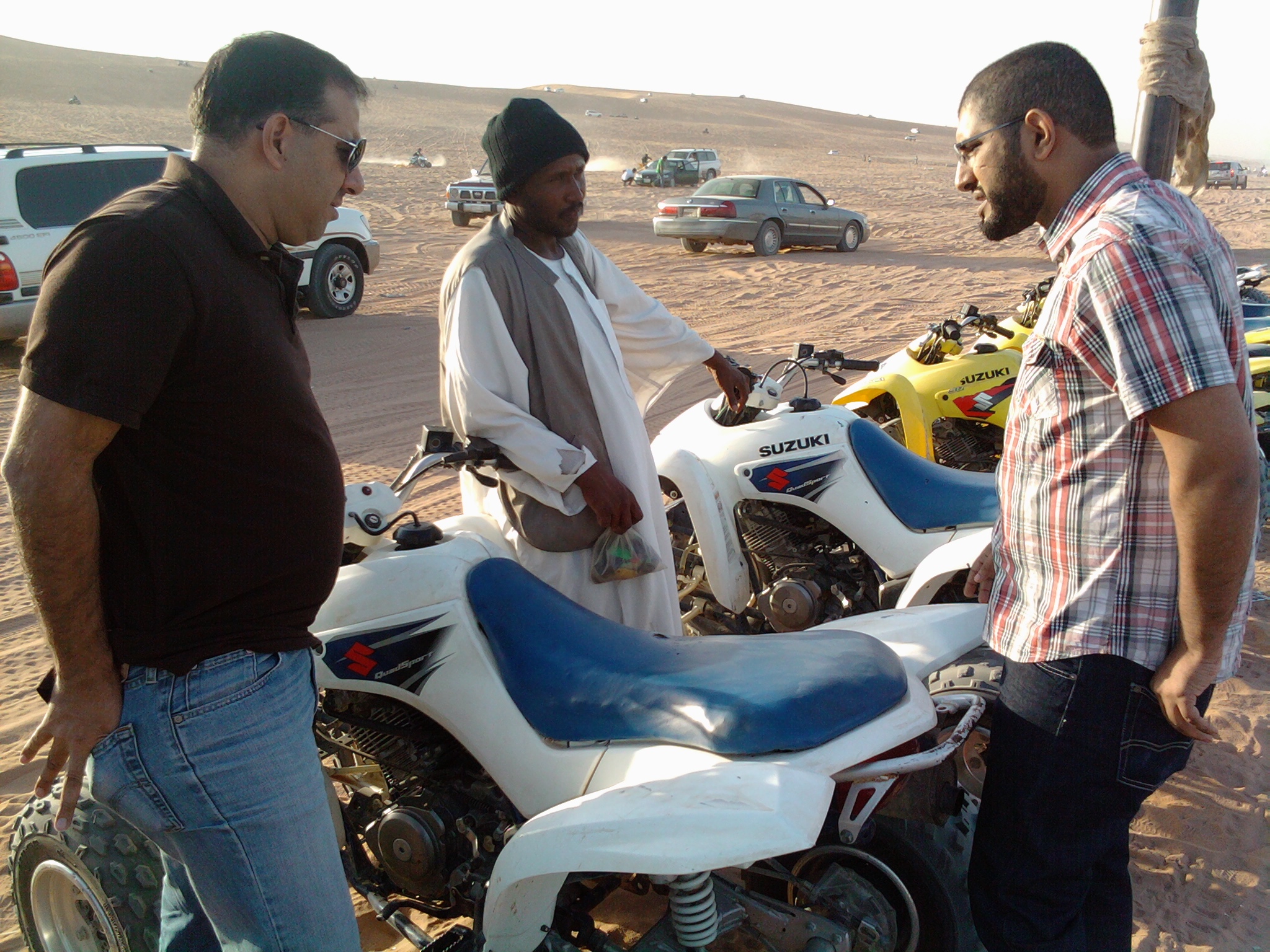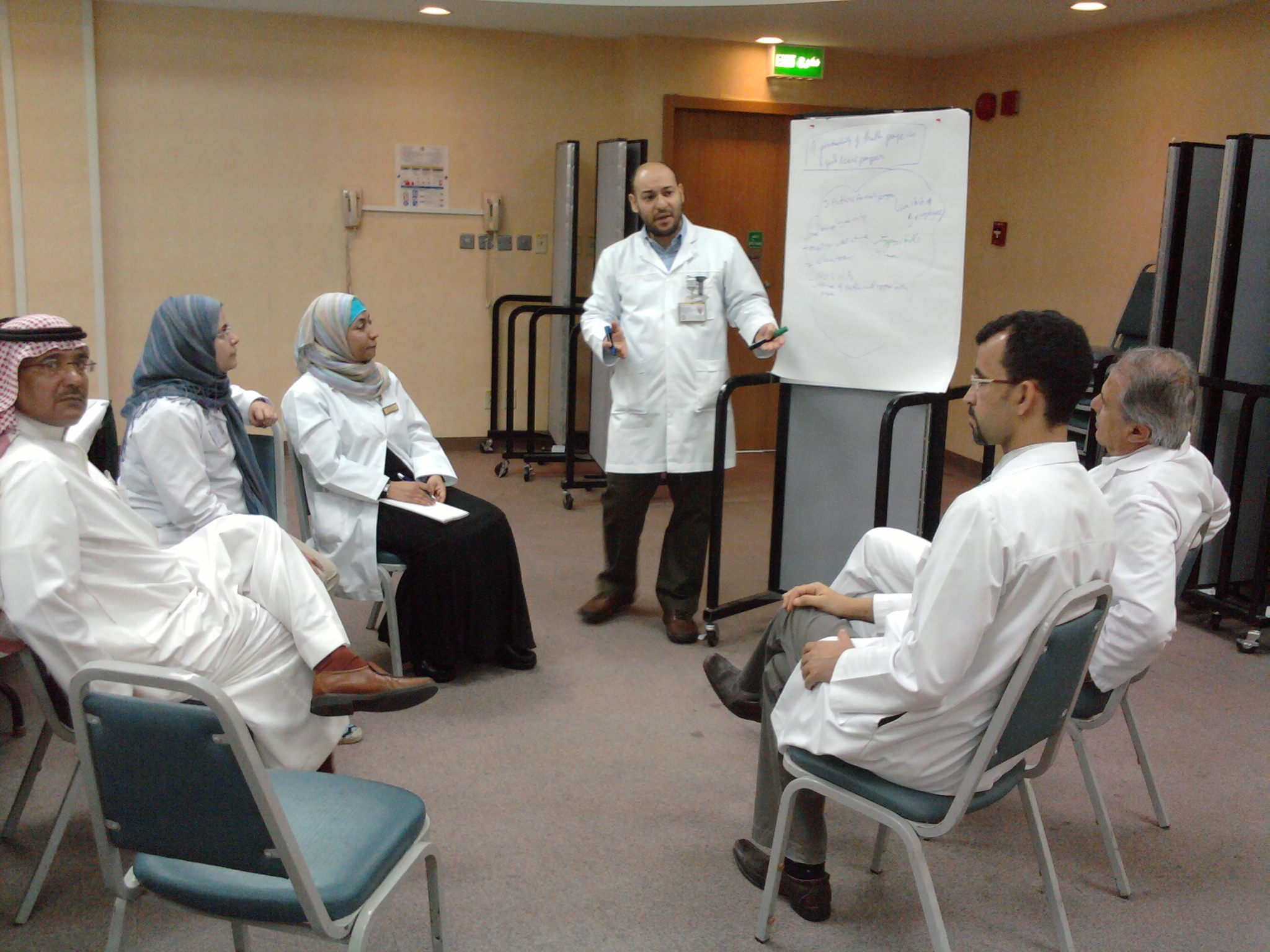Those People, That Person
/Apologies to my follower (singular intended) for taking a three month break from the blog. The combination of a horrendous work schedule and an overactive laziness gene was too much to overcome. But now I’m back, writing with a renewed sense of mediocrity. I’m currently on my way home from one of the most eye-opening business trips of my short and illustrious career. My work took me to Saudi Arabia, home to the King Faisal Specialist Hospital and Research Center. Apparently, they wanted some training in critical thinking and problem solving. How they got my name, I’m still not sure. I think my application to Saudi Arabian Idol must have been mis-routed.
Needless to say, my trip to The Kingdom caused my nervous mother to wear out a mountain of Rosary beads praying that I wouldn’t be arrested, abducted, or put into indentured servitude as the King’s personal ear hair trimmer. I must admit, I had a bit of anxiety, too. I’ve never traveled to the Gulf, and had no idea what to expect. My limited information comes from a mild recollection of scattered news reports and conversations with other Americans who have never been there.
Research is not my strong suit.
Before my trip, I read a couple of websites to beef up my knowledge and avoid Saudi prison. The consistent theme was that Riyadh is the most conservative city in the country. Sounds like a perfect place for a bleeding-heart liberal like me. Some of the do’s, don’ts, and punishable offenses included:
- Never be seen with any woman who isn’t related to you.
- Don’t touch people with your left hand.
- Don't eat with your left hand.
- No alcohol (not even beer with pizza).
- Don’t point the bottom of your shoe toward anyone else.
- Do not eat in the family section of the restaurant. Men must sit only with other men.
- Don’t take pictures of women or government buildings without permission.
While learning these helpful tips might make the average person feel more confident, it had the opposite effect on me. I’m not a guy who’s known for being good in a crisis. When danger calls, I can be found flailing my arms and telling people they’re probably going to die. It’s not my most attractive quality. I now realized I would be spending a full 18 hours standing in front of a Saudi audience, teaching, telling stories, and offering amusing anecdotes. The odds were pretty good I was going to cross a line of appropriate behavior at some point. Pair this with my lack of planning, and it was a recipe for disaster. “Those people” might flog or stone me.
Gabby must have noticed my heart palpitations, because she quickly put me in touch with a Jordanian friend of hers who, as luck would have it, had recently taken a job in Riyadh. Raed and I arranged to meet on the day of my arrival.
Coming out of the airport, any hopes I had of blending in were quickly dashed when I met my driver, Octavio, surrounded by dozens of men dressed just like him. It reminded me of my college days when I was the only white guy in the University of Tulsa Gospel Choir. I could sing as soulfully as anyone in the room, but I could never figure out how to sway in the right direction. A dead giveaway.
* The driver, Octavio
I met Raed later that afternoon in my hotel lobby after a short nap. He had arranged for a Saudi friend of his, Mohammad, to give me a taste of life in The Kingdom.
We drove an hour outside of the city where the Saudi’s had turned a bunch of sand dunes into a virtual weekend amusement park. Families in 4x4 pickups and Ford Crown Victorias were racing around the mountains of dust while four-wheelers darted in between. Though none of us had ever piloted anything more risky than a ten-speed, we convinced each other to rent some ATVs and try it ourselves. It was a blast.
* Raed (left) and Mohammad (right) negotiating with the ATV rental guy, who is saying "how do I know that gangly white guy isn't going to trash my four-wheeler?" As you can see, they had no response.
* if you're not distracted by my crazy ATV hair, you can make out the faint image of people driving like maniacs on the dunes in the background.
At dinner afterward, covered in dust, I asked Mohammad to teach me about Saudi culture. He started by ordering way too much food, and serving me until my gut busted.
Saudi hospitality.
Then he gave me the low-down. He wears the traditional garb (a thobe) to work, but dresses like you and I do on the weekends. He has two kids (4 and 2) who talk back and give him fits. He and his wife like to watch TV to unwind in the evenings. On weekends, they go to a family “cabin” outside of town and listen to music, play cards, and chat. His wife wears an abaya in public, but wears whatever she wants in the home. He’s a devout Muslim, but sometimes skips out on the sermon because “it’s kinda’ boring… and one time, I caught the imam repeating the exact same message two weeks in a row!”
I asked him about my class. What should I be concerned about? What should I avoid?
“Just be yourself.”
Wanting more direction, I worriedly asked, “What about the classroom participation? Will the women need to be segregated? Will they even speak? Do I need to be concerned about how I break up the class into small groups? Is it OK to tell jokes? Show videos? Tell silly stories about Gabby and me?”
“No problem!” Read chimed in. “Maybe don’t call on people directly and put them on the spot. Might make them uncomfortable. Especially if they don’t speak English very clearly. And don’t force groups to work together. Let them pick which small group to join.”
That sounds a lot like the rules I use in the U.S.
“But most important is just be yourself. Saudis love learning, and love learning from westerners. So, you already have that working for you. If you have passion about what you’re teaching, that’s really all that matters.”
Surprised.
“And the women will love you. You just wait!”
Double-surprised.
So I taught the class. Two full days. I survived. It was an experience, to be sure.
* A group of hospital leaders coming up with ideas to make patient education more efficient and effective.
* This leadership team is working on ways to encourage pediatric cancer patients to follow their treatment regimen when they leave the hospital.
When asked about trips overseas, it’s sometimes tempting to tell people all of the ways that “they” are just like “us.” Fostering the belief that we’re all the same deep down. Part of one big happy family. And it would be partly true to say that, because I heard the Saudis say a lot of things in Riyadh that I might have heard coming from an American in Rhode Island.
- “We need to improve our employee satisfaction.”
- “I’ve never ridden a camel. I just don’t see the appeal.”
- “The employees here often have great, innovative ideas, and some leaders are fantastic… but some managers and leaders don’t listen very well.”
- (whispered to me before class) “Dr. Ibrahim is a well-respected leader, but he can be loud and overbearing, and take over conversations. Just be aware of that, and try to encourage comments from others. (pause) And mix up the groups a lot so none of us has to work with him the entire time.”
- Mohammad: “’Everybody Loves Raymond’ used to be may favorite show. Now it’s ‘Modern Family.’ My wife and I are just like the Dunfy’s.”
Faryal: (wearing a burka) “I love that show, too! The old guy and his wife are hilarious!”
But as common as these statements are, there are distinct differences in people and cultures. We’re not all alike. I was at the restaurant eating dinner with Raed and Mohammad when evening prayer time came (maghrib). The shades were quickly drawn and the doors were locked. We were stuck inside for 30 minutes while everyone on staff went to the back to pray. This happens five times per day.
There’s a “singles only” line and a “families only” line at Mc Donald’s. Though this probably doesn’t sound so foreign to those looking for lunch in Alabama in 1966, the year my sister was born.
And it was an adjustment for me to tell some of the women apart who were wearing a full face covering, with only their eyes showing. It sure makes it easy to call them “those people” when they are all dressed exactly the same. Although I do note the irony in writing this as I sit here wearing Aeropostale jeans and an Old Navy shirt also worn by ten million other guys in the U.S.
But most profound was the lesson I learned from Meshael. She was the one who helped me coordinate travel arrangements and other logistics. Meshael is probably 30 years old. Married. No kids. Wears an abaya with face covering, only her eyes peeking through.
When the first day of class was finished, she walked me through the maze of hospital hallways to the area where I could catch my ride. I waited alongside all of the female employees, clad in black, waiting for their rides home, as they aren’t allowed to drive themselves.
I made small talk with Meshael. We talked about the weather. Family. The city. The hospital. Restaurants. My desire to try authentic middle eastern food.
We had a pause in conversation. Maybe twenty seconds. She turned toward me and asked,
“Mr. Scott, would you like a date?”
“Excuse me?” I flashed to the comment from Raed.
The women will love you. You just wait.
My face revealed confusion and panic. This is highly inappropriate. Arms beginning to flail. What to do? I’m a happily married man! What is appropriate in this culture?!
“Dates. Do you like dates? We are famous for our dates here.” Meshael clarified.
“Oh!” I said, realizing this was not a love connection, but rather, a continuation of our food and restaurant discussion. “I don’t know. I don’t eat a lot of dates.”
“I will bring some tomorrow for you. A gift for your wife and family. We have all kinds. They are very delicious.”
“You don’t have to do that.”
“No. I will bring them.”
“That would be wonderful. You are far too kind.”
The next morning, I walked into the classroom to prepare for the day. Meshael had arrived early. She held a big red bag in her hand.
“Mr. Scott. Here are the dates.”
She handed me the bag. It weighed about four pounds. I opened it and pulled out two large containers. One a gold tin, and another with a clear lid revealing the contents. The candied dates were all arranged perfectly.
“There are dates dipped in chocolate, Dipped in honey. Rolled in sugar. And here are some plain ones. You must sample them all.”
Her letterbox-framed eyes were sparkling.
I looked back at her, wishing I could see her face. So hard, when “those people” are donned in the same black flowing obscurity. What does she look like? Is her hair black? Or colored? Curly or straight? What about her ears? Does she wear earrings? Lipstick? Freckles?
But I’ll never see her face. Never know what she looks like on the outside. But perhaps that’s the way it should be. Because in my mind I imagine a beautiful, genuine, radiant smile. Honest. Authentic. Warm.
Finally seeing “that person” for the first time.
*image from asianews.it







